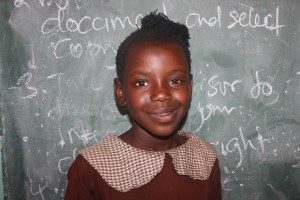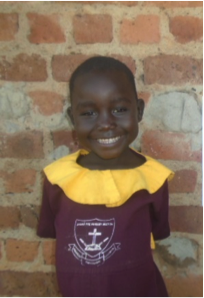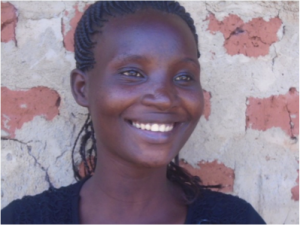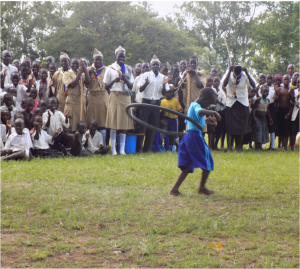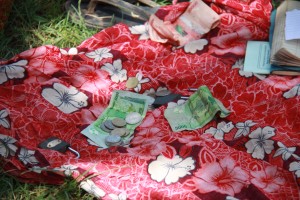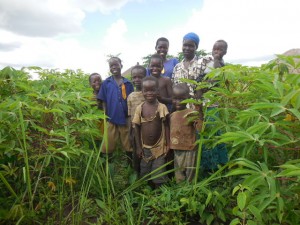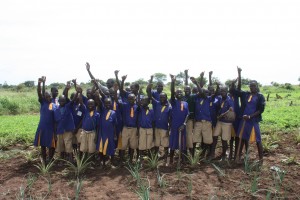Happy Christmas from Sebastian and Miriam in Zambia!
December 11, 2015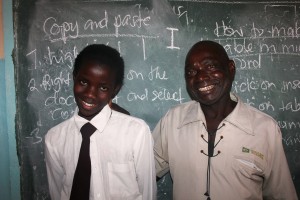 The heating has been turned up a notch, decorations are up, and the Christmas jumpers are on…at African Revival, we are really beginning to get into the Christmas spirit! With the big day drawing closer, we’ve been having fun finding out how the families at African Revival supported schools will be celebrating this festive season! Today, we talked all things Christmas with grand-father and grand-daughter dream team, Sebastian and Miriam. Fourteen year old Miriam is currently in Grade 9 at Bwacha Basic School- a school situated within the town of Kalomo where our Zambian offices are based. Sadly, her father died this year, so she now lives with Sebastian, her grand-mother Martha and her younger cousin Mono Effemia who is in Grade 4 at the same school. Sebastian, a retired teacher, and Martha have eight grown-up children, all of whom have moved out with the exception of their youngest daughter. As you can imagine, Christmas is a bustling and exciting time in their household!
The heating has been turned up a notch, decorations are up, and the Christmas jumpers are on…at African Revival, we are really beginning to get into the Christmas spirit! With the big day drawing closer, we’ve been having fun finding out how the families at African Revival supported schools will be celebrating this festive season! Today, we talked all things Christmas with grand-father and grand-daughter dream team, Sebastian and Miriam. Fourteen year old Miriam is currently in Grade 9 at Bwacha Basic School- a school situated within the town of Kalomo where our Zambian offices are based. Sadly, her father died this year, so she now lives with Sebastian, her grand-mother Martha and her younger cousin Mono Effemia who is in Grade 4 at the same school. Sebastian, a retired teacher, and Martha have eight grown-up children, all of whom have moved out with the exception of their youngest daughter. As you can imagine, Christmas is a bustling and exciting time in their household!
It has been a tough year for Miriam, but she is looking forward to Christmas because it provides a precious opportunity “to celebrate good things with my family”. As the family are Catholic, Sebastian shared that they “spend lots of our time at church on Christmas, and then we go home to celebrate once the service has ended”. We were curious to know what these celebrations look like so Sebastian explained that “We usually have a special meal with the whole family- the whole family comes, and even sometimes the neighbours join us“. The family’s festive feast consists of “all the usual foods, but then some special items like rice and fish and chicken. Of course, we don’t leave out the vegetables, and our traditional Zambian dish of Chiwawa which is pumpkin leaves, prepared with pounded ground-nuts.” Miriam tells us that her favourite item on the Christmas dinner table is the chicken! As Miriam always helps her grandmother sweep the house before guests arrive, and washes the pots and plates after the last mouthful of Chiwawa has been eaten, we think Miriam deserves a very big piece of chicken!
Once the family has celebrated Christmas in style, they have plenty of exciting projects up their sleeve for the coming year; Sebastian shared their up-coming plans with us: “as a family, we have decided that we wanted to go back to farming. In the next coming year, we will have two homes- in town and one at the farm, where we want to grow crops- we tend to grow maize, and cassava and also ground-nuts. So, we would like to at least see some harvest, and then sell part of it and then keep some of it for family consumption.” Miriam also has a significant year ahead, because she will be taking her Grade 9 exams which will determine whether she can progress with secondary school, so her wish this Christmas is to pass her exams because “school is very important to me, as it will help me in my future”.
We wish Sebastian, Miriam and their whole family a very happy Christmas and we hope that 2016 brings them a plentiful harvest and exam results which are even better than Miriam wishes for!
Posted in News | Leave a comment
Season’s Greetings from the Muzembo family in Zambia!
December 9, 2015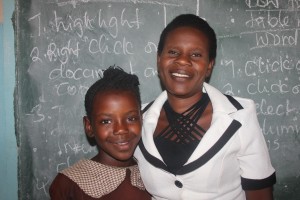 Here at African Revival, we are getting rather excited about Christmas…the food, festive jumpers, the carols, and of course curling up with Christmassy movies! These are some of the ways we will be enjoying the season, but how do the children in the schools we support in Zambia celebrate Christmas? We recently enjoyed a good old yuletide natter with the Muzembo family from the town of Kalomo (where our Zambian offices are based), who told us all about how they usually spend Christmas!
Here at African Revival, we are getting rather excited about Christmas…the food, festive jumpers, the carols, and of course curling up with Christmassy movies! These are some of the ways we will be enjoying the season, but how do the children in the schools we support in Zambia celebrate Christmas? We recently enjoyed a good old yuletide natter with the Muzembo family from the town of Kalomo (where our Zambian offices are based), who told us all about how they usually spend Christmas!
Mrs Muzembo is a cleaner at the local hospital and her husband works as a businessman selling paving bricks and building blocks; he is also the director of a private school! Together the couple have four children: Abel, Christine, Cedric, Pardon, and Lovely. The children attend several different schools in Kalomo, but Christine and Cedric are currently attending an African Revival supported school- Bwacha Basic.
For the family, Christmas is a very special time because, as Christians, they celebrate joyfully as “it is the day Jesus Christ was born…although people have many different beliefs about Christmas, this is what we believe and so on Christmas day, we go to church, we praise and sing and sometimes even have overnight prayers, and then we come back home”. After the family have attended church celebrations, they make their way back home with their friends to continue the festivities. In fact, every year, they take it in turns to host a big Christmas meal; Mrs. Muzembo explained to us: “we organize amongst ourselves and say “this year, it is you who is going to prepare Christmas”. When it is our turn, we prepare lots of food; we also buy drinks and make cakes. We invite friends, and we sing and dance, so that everyone is happy!”
Additionally, many of the family’s members were actually born in December (including Mrs. Muzembo who was born on the 29th December!) so Christmas day also doubles up as an opportunity to host birthday celebrations for anyone born during the month of December! In the midst of all excitement, the children particularly enjoy indulging in food they don’t normally have. For example, Christine loves the tinned spaghetti hoops which her mother serves as a treat! For dessert, the family always buy ice-cream cake which, as you can imagine, is a firm favourite among children and adults alike! However, one more traditional item which Mrs. Muzembo always prepares is Chiwangto, a kind of sweet beer made with mill porridge- it is a staple festive drink in many Zambian households around Christmas time!
Christmas is quickly approaching, and the family are already preparing for the big day but as they look forward to Christmas, they have also been reflecting back on the past year giving thanks that “we have been able to go through the whole safely- we are very thankful to God.” So, what does the year ahead have in store for this lovely family? Mrs. Muzembo proudly told us: “we are all looking forward to 2016; I am happy with my family- they are all bright so next year, I want to make sure they all get to go to a good boarding school- I am working hard to make sure this happens”. Christine enthusiastically echoed this hope; her Christmas wish is to pass her exams and get accepted into a boarding school! We’d like to wish the Muzembo family a very merry Christmas indeed, and we hope all their Christmas wishes come true!
Posted in News | Leave a comment
Christmas in Zambia with Jenny and Grace!
December 4, 2015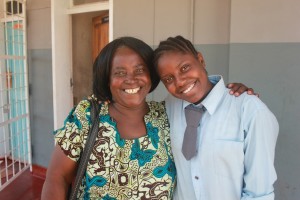 As we begin the countdown to Christmas (who is getting very excited now?!), we have been chatting with parents and children from African Revival supported schools in Zambia, to find out how they will be spending Christmas! Today, we met mother and daughter duo, Jenny and Grace, who shared with us how they will be celebrating the day.
As we begin the countdown to Christmas (who is getting very excited now?!), we have been chatting with parents and children from African Revival supported schools in Zambia, to find out how they will be spending Christmas! Today, we met mother and daughter duo, Jenny and Grace, who shared with us how they will be celebrating the day.
Sixteen-year old Jenny is in Grade 9 at Kalomo Basic School, which is located just five minutes from our offices in the town of Kalomo! Jenny is the youngest of nine siblings, so she is the only child still at home with her parents. It can be a little lonely, which is why she loves Christmas because it is time when “the whole family comes together, and we celebrate together!” Of course, being such a large family, not everyone can always make attend the gathering especially because some of Grace’s children live in Lusaka, and by the Congolese border but Grace tells us: we are flexible; whoever is able to will come around and congregate together”. A Christian family, Christmas is particularly significant to them because it marks the day Jesus came into the world, and so they tell us that they enjoy celebrating this historical moment together by attending a special church service.
Once the family is together and they have attended church, they can prepare a big feast: “if we have money, we will buy certain meats, and we bake…it just depends on what we have.” To ease the financial strain which hosting Christmas can bring, everyone in the family brings a dish to the table. Grace explained “we all help prepare the food. For example, one person will bring one dish, another might bring a big salad, and another will contribute a chicken…this way, we all do it together”. During these preparations, Jenny is her mother’s right-hand helper and she enjoys helping whip up all the festive dishes. Jenny’s favourite part of the meal is scones, which they enjoy with tea!
So, aside from all the delicious food, what is the best thing about Christmas? Jenny shared with us what she loves about the day: “the best thing about Christmas is just celebrating, and just being happy on that day- playing with my friends and going to church! We like to have music, and making a party!” In fact, her Christmas wish is that the whole family will be happy, and will be able to all celebrate together! As for Grace, “my wish is to bring all my grandchildren together-I have ten grand-children; some live close by but others really live far away so it is nice that we can come together. The grand-children get so excited, and I love seeing that! I enjoy spoiling them when I see them- I cook for them-chicken, or even kill a goat!” Jenny, too, enjoys having her nieces and nephews about, and loves playing ball games with them whilst the parents are having a post-lunch snooze!
We hope that the family have a fabulous Christmas reunion, and that Grace and Jenny’s wishes for their Christmas come true! Merry Christmas!
Posted in News | Leave a comment
Christmas with the Shapota family in Zambia!
December 1, 2015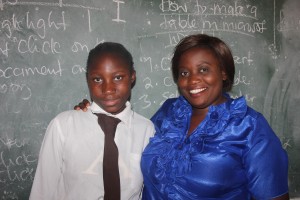 Ever wondered how families in different parts of the world celebrate Christmas? We decided to find out how Zambian households mark the season, so we recently caught up with the Shapota family who shared with us how they celebrate on the 25th December! The family of three includes Mrs. Shapota (a trainee teacher), her businessman husband Alfred and their nine-year-old daughter Martha who attends Bwacha Basic School, an African Revival-supported school.
Ever wondered how families in different parts of the world celebrate Christmas? We decided to find out how Zambian households mark the season, so we recently caught up with the Shapota family who shared with us how they celebrate on the 25th December! The family of three includes Mrs. Shapota (a trainee teacher), her businessman husband Alfred and their nine-year-old daughter Martha who attends Bwacha Basic School, an African Revival-supported school.
Mrs. Shapota offered us some insight into how Christmas is celebrated in the town of Kalomo: “people all celebrate in different ways- some go to church at that time and worship, and some just like to celebrate by drinking lots of beer with their friends. Others, like us, like to celebrate at home, by having a nice big party.”
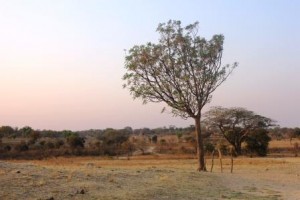 For her family, Christmas means “deciding to remember the birth of Lord Jesus on that day- that’s how I see it.” To celebrate this occasion, the family either host a party in their home, or go out of town to spend the day with relatives. So, what do these gatherings look like? “If we celebrate at home, we make a cake, we cook nice food, we buy drinks, we’ll invite friends and family members over and we’ll eat the whole day and celebrate together”. Just like in the UK, preparing a special Christmas meal is an important part of the festivities in the Shapota household: “nowadays, people are always busy, so once you get home, you just want to cook something fast, but on Christmas, you take your time, making traditional dishes. We make a special traditional drink called Chiwangto- you make a porridge using mill rice, then you soak some roots in water. When the porridge is ready, you add the liquid from the roots, and mix together and leave overnight, and then the next day it is ready to drink!” This drink is a favourite of Martha’s and in fact, her favourite aspect of Christmas is all the yummy foods she is able to enjoy during the festivities!
For her family, Christmas means “deciding to remember the birth of Lord Jesus on that day- that’s how I see it.” To celebrate this occasion, the family either host a party in their home, or go out of town to spend the day with relatives. So, what do these gatherings look like? “If we celebrate at home, we make a cake, we cook nice food, we buy drinks, we’ll invite friends and family members over and we’ll eat the whole day and celebrate together”. Just like in the UK, preparing a special Christmas meal is an important part of the festivities in the Shapota household: “nowadays, people are always busy, so once you get home, you just want to cook something fast, but on Christmas, you take your time, making traditional dishes. We make a special traditional drink called Chiwangto- you make a porridge using mill rice, then you soak some roots in water. When the porridge is ready, you add the liquid from the roots, and mix together and leave overnight, and then the next day it is ready to drink!” This drink is a favourite of Martha’s and in fact, her favourite aspect of Christmas is all the yummy foods she is able to enjoy during the festivities!
However, the family love sharing these special dishes and the excitement of the festive season with those less fortunate than themselves, and so “we invite our families to come to our house because there are people in the family who are poor and cannot afford to make a party for themselves, so we invite them so they don’t feel that Christmas is not for them; you invite them all who cannot provide for themselves- and friends and neighbours as well.” It sounds as though the Shapota home is a great place to spend Christmas, but Martha’s Christmas wish is to spend the day in Choma- a bigger town 62km away, because she finds Choma more exciting than the small town of Kalomo! We wonder, if she coaxes her parents enough, whether her wish will come true?!
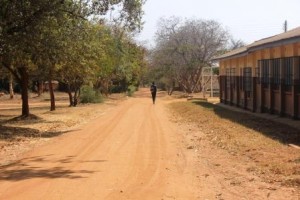 Unsurprisingly, the family is already looking forward to the big day and have high hopes for the New Year ahead: “2016 is a year of voting, and we are hoping for a good change in Zambia because now we are suffering a lot, because the Kwacha (the Zambian currency) is losing value and things are getting more expensive everyday, but we have great hope that next year will be different, and the way of life will be different”. As for Martha, her greatest hope is to pass her exams! We hope that the Shapota family enjoy their fabulous Christmas plans, and that 2016 is a prosperous and successful year-full of good things!
Unsurprisingly, the family is already looking forward to the big day and have high hopes for the New Year ahead: “2016 is a year of voting, and we are hoping for a good change in Zambia because now we are suffering a lot, because the Kwacha (the Zambian currency) is losing value and things are getting more expensive everyday, but we have great hope that next year will be different, and the way of life will be different”. As for Martha, her greatest hope is to pass her exams! We hope that the Shapota family enjoy their fabulous Christmas plans, and that 2016 is a prosperous and successful year-full of good things!
Jumpstart ! – Breaking ground in northern Uganda
November 24, 2015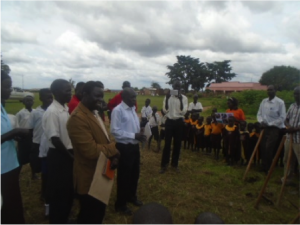 To mark the first phase of construction of our jumpstart ! playgrounds, funded by
To mark the first phase of construction of our jumpstart ! playgrounds, funded by
UKAid Match and the UK Department for International Development (DfID), a symbolic ‘groundbreaking’ ceremony was held on Monday 16th of November at Anaka P7 Primary School in Nwoya District. Parents, teachers and district officials attended the event, as well as representatives from our implementing partner  East Africa Playgrounds. However, the most important attendees on this occasion were the pupils themselves, who will directly benefit from the new play facilities. Lydia, aged five (pictured right) and currently in K2 at Anaka P7 Nursery, was particularly excited about trying the new swings and slides !
East Africa Playgrounds. However, the most important attendees on this occasion were the pupils themselves, who will directly benefit from the new play facilities. Lydia, aged five (pictured right) and currently in K2 at Anaka P7 Nursery, was particularly excited about trying the new swings and slides !
The playground will also include a sandpit, a climbing wall, elephant and zebra models and a drum set – plenty of new things to try for the pupils at Anaka P7 ! These facilities will reflect the local environment in northern Uganda, both in form and material, so that they are familiar to the children and fit with the context of their daily lives.
The playgrounds will provide children with an engaging, stimulating outside space that will allow them to play, explore and develop in a safe environment. Learning environments make a huge difference to a child’s learning, and we now know that stimulation in early childhood is crucial to brain development and school readiness. The jumpstart! Playgrounds, funded in part by the UK Department for International Development (DFID), will enable children to learn and develop in vibrant surroundings.
Evelyn (left), an ECD Caregiver at Anaka P7 is also confident that the playgrounds will increase the quality of pre-primary education at Anaka, not only by boosting childhood creativity and social skills, but also by encouraging parents to enrol their children in nursery school because “parents like taking their children to centres with play facilities”.
The ECD centre at Anaka also recieved a very significant seal of approval from the local Nwoya District Education Officer :
“To show my confidence in this school, I will bring my grandchild from Gulu to study here “
Parents with higher incomes usually educate their children in Gulu town, where the education is considered to be of higher quality than in the rural areas. So this vote of confidence from a high tier official from the local government is significant, as it may serve as an encouragement to other parents to enrol their children in the ECD centre.
Overall, our jumpstart! goal is to improve the quality of nursery education in a holistic manner – by focusing on all aspects of a child’s learning experience, both inside and outside of the classroom.
Posted in News | Leave a commentSDG Village Savings & Loans Associations : Saving for a brighter future…
November 24, 2015
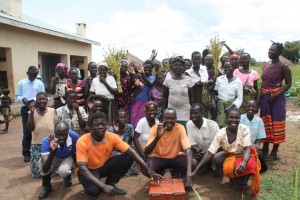 Through the School Demonstration Project, African Revival has now trained VSLA groups at all 15 schools involved in the project and provided savings kits to the groups, including logbooks to keep track of their loans and savings, and a lockable savings box. The aim of the VSLA savings scheme is to instill a savings culture amongst the members of the SDG and increase financial security at a household level. Many SDG members have never had formal bank accounts and have no other way to save their money. VSLA trainings increase skills in financial management, and also encourage members to establish personal saving goals, which vary according to the problems that they prioritize. Some intend to use the savings and loans system to invest in their businesses, boost agricultural productivity or pay medical bills, while others want to pay their children’s school fees. Whatever their goals, the VSLA provides members with a secure way to save their money, enabling them to better meet their immediate and future needs.
Through the School Demonstration Project, African Revival has now trained VSLA groups at all 15 schools involved in the project and provided savings kits to the groups, including logbooks to keep track of their loans and savings, and a lockable savings box. The aim of the VSLA savings scheme is to instill a savings culture amongst the members of the SDG and increase financial security at a household level. Many SDG members have never had formal bank accounts and have no other way to save their money. VSLA trainings increase skills in financial management, and also encourage members to establish personal saving goals, which vary according to the problems that they prioritize. Some intend to use the savings and loans system to invest in their businesses, boost agricultural productivity or pay medical bills, while others want to pay their children’s school fees. Whatever their goals, the VSLA provides members with a secure way to save their money, enabling them to better meet their immediate and future needs.
Olaa Amilobo VSLA
The VSLA at Olaa Amilobo Primary School is now in its 11th week of saving, after forming in August 2015. The group is formed of 53 members, who also make up the Parent’s School Demonstration Garden. Most recently, members have undergone VSLA training to instruct them in proper financial management techniques, such as how to keep a record of savings in their logbooks.
And the training has paid off; the group has so far saved a grand total of 930,000 Ugandan Shillings (£170). Not bad for 11 weeks of work! The group has also introduced a fine system, where members are penalized 500UGSH (10p) for late arrival, absconding from farming duties or poor quality work; so far a total of 55,000 (£10) has been accumulated from fines, which has been added to the savings. Members can also take out loans from the VSLA, which are calculated by multiplying the amount a particular member has saved by three. Members pay 10% interest on these loans.
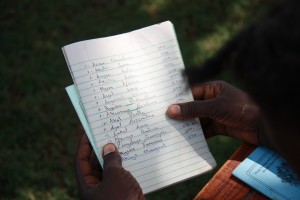 Through the VSLA, group members have established personal savings goals. Many intend to use profits from the garden, and the resulting savings, to pay their children’s school fees. Indeed, Headteacher Julia Acheng identified late payment of school fees as one of the main problems faced by the school, but believes that the VSLA will help to mitigate this challenge:
Through the VSLA, group members have established personal savings goals. Many intend to use profits from the garden, and the resulting savings, to pay their children’s school fees. Indeed, Headteacher Julia Acheng identified late payment of school fees as one of the main problems faced by the school, but believes that the VSLA will help to mitigate this challenge:
“If the money is already there, I can’t see the reason why they will refuse to pay. I think that one [the VSLA] will be of great help”
SDG member and VSLA Secretary Joseph Gim agrees. He has already taken a loan to pay his daughter’s school fees, and says now he is able to meet his needs, including a rather unexpected one:
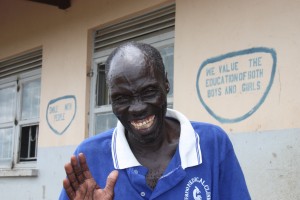 “I am able to meet them [needs]. Because with that money that I’m taking from there, I’m able to buy all the things, school fees, food and mattresses”
“I am able to meet them [needs]. Because with that money that I’m taking from there, I’m able to buy all the things, school fees, food and mattresses”
Because home comforts are important too! He also has plans to take a loan in the future to increase his agricultural productivity at a household level:
“In the future, I hope to use a loan to buy cows from the Masindi. Some to feed the children, some I need to go with to dig the garden. I’m doing it now with a hoe. So with a cow, it will be easier and take less time”
The VSLA is providing Joseph with the means and motivation to better manage his finances, allowing him to meet his children’s needs in the present, and plan for the future.
Posted in News | Leave a comment
SDG staff profiles: Meet Patrick!
November 23, 2015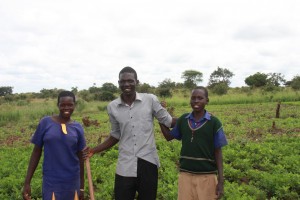 Patrick Ocaka is one of African Revival’s Volunteer Agricultural Extension Workers, responsible for supporting the work of the Livelihoods team. He recently graduated with a degree in agriculture from Kyambo University in Kampala and joined African Revival in January 2015 on a voluntary basis to gain experience. Read more about Patrick here and his role with AR!
Patrick Ocaka is one of African Revival’s Volunteer Agricultural Extension Workers, responsible for supporting the work of the Livelihoods team. He recently graduated with a degree in agriculture from Kyambo University in Kampala and joined African Revival in January 2015 on a voluntary basis to gain experience. Read more about Patrick here and his role with AR!
I’m originally from Nwoya district, but I moved to Gulu when I was in Primary 1 (aged 5). You see, Nyowa back then, it was not a safe place because of this conflict, so most of my life I spent in Gulu.
In my free time I like reading novels. I’ve read Dreams From My Father by Barak Obama. It’s a good book. I also like reading the bible. And now I spend my time watching football matches. I’m a proud Liverpool fan.
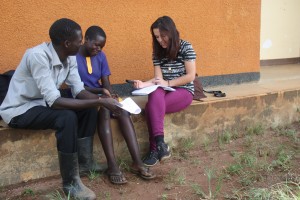 I went to Grace Christian Academy, which is the first school supported by African Revival. It was an orphanage school, so that’s where the founder of African Revival began his work. And that’s where AR actually came to life. I was there, I saw African Revival, I met Mr Tony Allen, I shook his hand, I was very proud. He’s the one who levied for my tuition fees. Actually AR started by sponsoring and we were the pioneer people who have been actually sponsored and got that benefit. For me, particularly by one of the AR Trustees, Mr Glenn James and his wife Mandy. Actually they helped me all the way of my life, so I’m very very proud and so much happy for them for the great job they have done for me, right from primary up to university level.
I went to Grace Christian Academy, which is the first school supported by African Revival. It was an orphanage school, so that’s where the founder of African Revival began his work. And that’s where AR actually came to life. I was there, I saw African Revival, I met Mr Tony Allen, I shook his hand, I was very proud. He’s the one who levied for my tuition fees. Actually AR started by sponsoring and we were the pioneer people who have been actually sponsored and got that benefit. For me, particularly by one of the AR Trustees, Mr Glenn James and his wife Mandy. Actually they helped me all the way of my life, so I’m very very proud and so much happy for them for the great job they have done for me, right from primary up to university level.
You see, with ambition, it keeps on changing as you grow. When I was younger, I wanted to become a medical doctor or a preacher. But then I saw that a medical doctor would not work because now what I’ve studied is contrary to the standard of becoming a medical doctor. I decided to now go for agriculture because God has been showing me some good mentors who are all agriculturalists. I like animals and crops very much – when I see a leaf of any crop swaying, green and very healthy, I just like it. The same applies to animals, I like to see them, be with them, they give me that life. So that’s why I want to work in agriculture.
I did my first internship with African Revival when I was in my first year of university. Now, again I’m back as a volunteer. Actually, now with the good work African revival has done for me, I myself decided personally that, even volunteering, I have to go for this organisation, they are the ones who have made me where I am now, so there’s no way I can let them down. So I’ve been following them closely to ensure that I also give my services as an appreciation to them. So I’m very proud to be here.
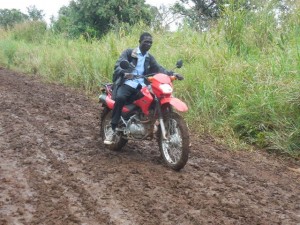 My favourite part of working for AR – well I like everything. But I most enjoy interacting with the community members and pupils. So I like actually getting to the field, talking to the community members, sharing, giving them the skills they need. And the pupils also, I like giving them the advice that can help them continue their schooling. In fact I just like working!
My favourite part of working for AR – well I like everything. But I most enjoy interacting with the community members and pupils. So I like actually getting to the field, talking to the community members, sharing, giving them the skills they need. And the pupils also, I like giving them the advice that can help them continue their schooling. In fact I just like working!
The SDG project is giving people new knowledge of farming new techniques of farming; they are now even able to plant new crops. Here the parents do subsistence farming, but normally not vegetables, normally grains – maize or rice – which is more carbohydrates. But now if we are to integrate vegetable farming in it, they are having a more balanced diet.
We started with 15 schools, but there are more schools in Amuru. To me, I wish that the project could expand to cater for all the schools in Amuru, so that all the parents in the district can have the benefits of the project. That is the only wish I have for the project. Because it is changing the lives of many people. So I pray the project can expand so the future of the younger generation can actually be to the expectations of their parents. Often the parents have the expectation but don’t actually contribute towards it. So if we can touch the rest (of the schools),that would be nice for me.
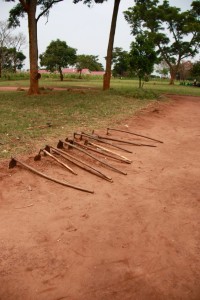 I have one woman who has said the project has done something great in her life. She has actually replicated the knowledge from the SDG back home in her garden. It is helping her a lot. In terms of food security, she is well. In terms of income, also she says she is ok.
I have one woman who has said the project has done something great in her life. She has actually replicated the knowledge from the SDG back home in her garden. It is helping her a lot. In terms of food security, she is well. In terms of income, also she says she is ok.
I’m looking forward to kicking off my farming activities. Personally, I do not have land. So I plan to get some good job, earn money and get some land, and get serious with farming. Currently I’m not farming, but in the future I’d like to farm in the northern region. Nwoya land is very fertile, in Uganda I think it’s the best land, so I may look towards that place and get land and be there in the farming. Step by step – start small, then later on keep going to get to farm on a commercial basis.
Posted in News | Leave a comment
Meet Sarah: business woman in the making !
November 20, 2015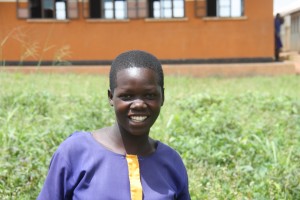 Sarah Aber, 14, is Vice Chairperson of the Pupil’s Entrepreneurship Club at Otwe Primary School Demonstration Garden. Her role varies from taking minutes at meetings, to mobilizing absconding club members and even organizing meetings herself if the chairperson is absent:
Sarah Aber, 14, is Vice Chairperson of the Pupil’s Entrepreneurship Club at Otwe Primary School Demonstration Garden. Her role varies from taking minutes at meetings, to mobilizing absconding club members and even organizing meetings herself if the chairperson is absent:
“My vice-chair responsibilities are that I should ensure that things are in place and going on as it was planned.”
The role is giving Sarah the opportunity to put all she has learned in the African Revival trainings into practice. Indeed, taking account of supply and demand, she plans to sell the group’s bean crop very soon because beans are currently scarce in Amuru district due to the drought – so Sarah is already anticipating that they will fetch a higher price at market:
“What we are going to do, we are going to sell our produce per kilo for 5,000 sh (90p, 10kr), because we understand that these beans are a bit scarce in the market […]
we want to have that opportunity so that we get more money from it”
Furthermore, Sarah has already helped to secure transport to the market in Gulu by negotiating to use the headmistress’s motorbike; the group will then use the profits generated by the sale of their bean crop to refund petrol costs.
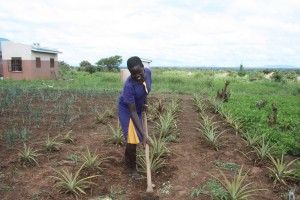 Sarah’s improved skills in farming, agricultural management and marketing have also sparked in her parents a greater interest in their daughter’s education:
Sarah’s improved skills in farming, agricultural management and marketing have also sparked in her parents a greater interest in their daughter’s education:
“This thing [SDG] is making my parents actually visit the school, because the knowledge I have now has motivated my parents to come and see what I am doing at school, and now they are happy, and actually in a week now, my parents can be here twice or three times […] checking on my report.”
And they are sure to be pleased. Sarah is a very good student, always placed in division two (meaning she scores approximately 80% in tests), and has ambitions to become an English teacher in the future. Sarah’s advice for other girls her age? To surround themselves with good friends who are a positive influence. And the knowledge she wants to pass to her peers is equally useful:
“ I’m going to teach them how to plant beans in lines and also how to manage bean production, right from planting up to investing; that’s what I am going to teach the rest.”
Sarah lives three kilometres from Otwe Primary School with her mother, father and six siblings. The family cultivates a range of crops, including groundnuts and rice, and has recently diversified further into growing vegetables.
The knowledge Sarah has brought back home from the SDG and Pupil Entrepreneurship Club is not only boosting the productivity of the family farm, but also teaching Sarah’s parents how to properly manage and market the surplus in order to generate a good profit:
“Sarah told us […] the importance of early planting which she said if we plant our crops early, we will be able to take the advantage of ready markets”
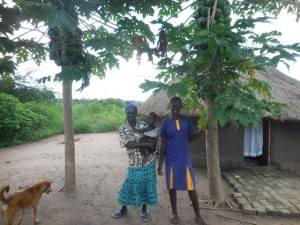 Sarah’s mother, Christine, is particularly enthusiastic about the skills that she has learnt from Sarah:
Sarah’s mother, Christine, is particularly enthusiastic about the skills that she has learnt from Sarah:
“We learnt from our daughter the marketing technique […] whereby we stock our produce as a group (with neighboring farmers) in bulk and later sell […] This is very good technique simply because in a group, there’s good bargaining power and no buyer can cheat us as compared to the way we used to in the past.”
Christine also credits Sarah with teaching her about good post-harvest crop management in order to avoid the losses that the family used to suffer. This includes how to dry, sort, store and handle different crops.
Moreover, Sarah has brought back new agricultural methods, teaching her parents how to plant in rows, as well as “the advantage of keeping our garden clean and weed free” in order to prevent pests. The new kitchen garden, situated right next to her cooking area, has also given Sarah’s mother a more efficient way to dispose of the kitchen refuse.
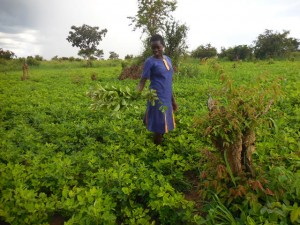 Christine hopes that these new business and agricultural skills allow her children to “take my footsteps in farming […] and make them to be self reliant and fruitful in the near future.”
Christine hopes that these new business and agricultural skills allow her children to “take my footsteps in farming […] and make them to be self reliant and fruitful in the near future.”
But she is also adamant that Sarah should continue her formal education at secondary level and apply her new skills to succeed at both farming and school, and in the future realize her dream of becoming a teacher.
Posted in News | Leave a comment
SDG: Pupils’ Entrepreneurship Clubs
November 18, 2015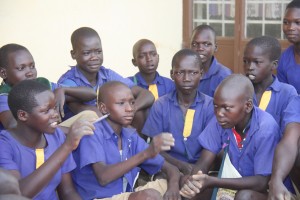 Pupils’ entrepreneurship clubs have also now been established in all 15 schools that African Revival works with through the School Demonstration Garden Project. There are 50 members with equal number of boys and girls in each school. The club members have elected their leaders and are being guided by a teacher from each school. Having selected their crops to plant, which will form their micro enterprises, members are now undergoing training on business planning and management using the School Enterprise Challenge methodology by Teach A Man to Fish. These newly acquired business skills are to be implemented within their school garden project. This practical application will serve as a unique and useful experience for these pupils, equipping them with the skills to flourish in the business of farming, leading to increased professional stability when they leave school.
Pupils’ entrepreneurship clubs have also now been established in all 15 schools that African Revival works with through the School Demonstration Garden Project. There are 50 members with equal number of boys and girls in each school. The club members have elected their leaders and are being guided by a teacher from each school. Having selected their crops to plant, which will form their micro enterprises, members are now undergoing training on business planning and management using the School Enterprise Challenge methodology by Teach A Man to Fish. These newly acquired business skills are to be implemented within their school garden project. This practical application will serve as a unique and useful experience for these pupils, equipping them with the skills to flourish in the business of farming, leading to increased professional stability when they leave school.
Otwe Pupils’ Entrepreneurship Club
The Otwe Primary SDG Pupils’ Entrepreneurship club is in high spirits. The bean crop that they planted back in March is doing very well, despite a prolonged drought and damage from stray animals. The rain has at last come, and the pupils are seeing the bountiful effects of their hard work. Soon they hope to harvest and have already started to scout out surrounding villages and towns to assess market potential and decide which marketplace will bring them the highest profit. Head of Marketing, Boniface Rubanga, explained in more detail how the club chooses where to sell:
“Me and the marketing team go to the market and ask for the middle man, and if we think that place can fit in our needs, we can choose that middle man to take the produce.
We prefer selling our things in kilos because with these cup things they can cheat you. For Kilos, you can weigh from here and you can easily come to market and know what you are going to get.”
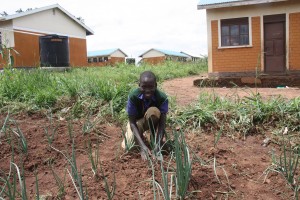 The club has recently received training in marketing skills to support them in this aspect of the project. African Revival Project Officer Babra notes that one of the principle objectives is to enable them to be self-reliant in the future:
The club has recently received training in marketing skills to support them in this aspect of the project. African Revival Project Officer Babra notes that one of the principle objectives is to enable them to be self-reliant in the future:
“We actually train them on how to produce, how to invest, how to add value to the products and how to market it […] our schools are located in the rural areas where the major activities are actually farming but the pupils have realized that the actual challenge faced is the marketing strategy.”
The skills transferred through the Pupil’s Entrepreneurship Club are helping to fill this gap in knowledge and ensure that pupils can effectively handle the post-production and financial aspect of farming.
And some of them already have interesting plans for how they will use the profits from the bean crop, a portion of which will be shared amongst group members (the rest will be added to the group account for future activities). Boniface wants to save his cut with the help of his mother, who is in the Parents’ VSLA group:
“I am in p6 and next year I am in p7. With these savings, it’s going to help me to buy some text books to help me prepare for the national examinations.”
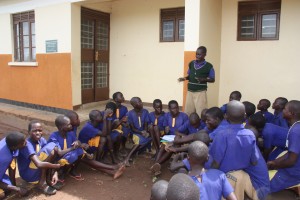 While Boniface has ambitions to become a vicar when he leaves school, he also intends to keep on farming alongside this profession in order to provide his household with a secure source of nutrition, and generate a profit through selling the surplus. As such, the business skills he is learning through the Pupils’ Entrepreneurship Club will continue to serve him well in the future.
While Boniface has ambitions to become a vicar when he leaves school, he also intends to keep on farming alongside this profession in order to provide his household with a secure source of nutrition, and generate a profit through selling the surplus. As such, the business skills he is learning through the Pupils’ Entrepreneurship Club will continue to serve him well in the future.
Posted in News | Tagged Development, Gulu, School Development, School garden, Uganda | Leave a comment

